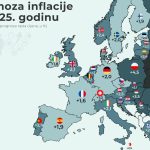“People’s yearning for the old way of life is understandable, but we must not make a wrong move. We are among more liberal countries in Europe in restricting different rights,” Beroš told a press conference, noting that 17 European countries had imposed a curfew and 20 were in some sort of lockdown.
“There is no room for relaxing, we must continue to be cautious. There is no curfew, no lockdown, face masks are not mandatory outdoors, shops and services are open except for cafes and restaurants, cinemas, theatres, galleries, and museums. If we look at cultural activities and gyms, they are closed in more than 20 EU countries and cafes and restaurants in 24 countries,” the health minister said.
Commenting on today’s protest rally by business owners because they cannot work, the head of the national coronavirus response team, Interior Minister Davor Božinović, said that most of the businesses were operating now.
“In Croatia, there are 215,000 registered businesses, and approximately 18,000 are closed now, which means that a majority of them are open. We are doing all we can so that as many businesses as possible can reopen at a minimum risk,” Božinović said, adding that the next moves would be considered before 15 February when the present set of measures expired.
He said that the criticisms addressed to the national response team were unwarranted given that Croatia had one of the most liberal epidemiological measures in Europe. “We are aware that people whose businesses are closed are in a difficult situation, but the decisions by the national response team are taken in consultation with professionals and can be compared to other countries.”
The Director of the Croatian Public Health Institute, Krunoslav Capak, said that the number of new coronavirus cases had declined by 15% from last week.
To date, 59,064 people have been vaccinated against COVID-19, for which 87,929 doses of vaccine have been administered. 30,199 people have received one dose and 28,865 have received two doses. 535 reports of side effects have been reported for the Pfizer vaccine and 15 for Moderna’s.
As for vaccine deliveries, Capak said that 19 boxes of the Pfizer vaccine were expected to arrive on 15 February and 20 boxes the week after that. Moderna will deliver 8,400 instead of 10,000 doses, while deliveries of AstraZeneca’s vaccine should start on 9 February, with 156,000 doses expected to be provided in three tranches.
Capak said there were no obstacles to the Russian vaccine being registered in the EU following the publication of a study on its effectiveness. The approval procedure at the European Medicines Agency takes about two months.








